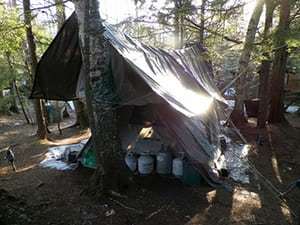What do you think?
Rate this book


5 pages, Audio CD
First published March 7, 2017
Another decade elapsed. The break-ins at Pine Tree increased with both frequency and quantity of goods stolen. By this point, a quarter century in, the whole thing was absurd. There was the Loch Ness Monster, the Himalayan yeti, and the North Pond hermit.

It's possible that Knight believed he was one of the few sane people left. He was confounded by the idea that passing the prime of your life in a cubicle, spending hours a day at a computer, in exchange for money, was considered acceptable, but relaxing in a tent in the woods was disturbed. Observing the trees was indolent; cutting them down was enterprising. What did Knight do for a living? He lived for a living.







"It's better to be tough than strong, better to be clever than intelligent ... I was tough and clever." — Christopher Knight
“People earnestly say to me here, 'Mr Knight, we have cellphones now, and you're going to really enjoy them.' That's their enticement for me to rejoin society. 'You're going to love it,' they say. I have no desire. And what about a text message? Isn't that just using a telephone as a telegraph? We're going backwards.”
― Michael Finkel, The Stranger in the Woods: The Extraordinary Story of the Last True Hermit”

















"The dividing line between himself and the forest, Knight said, seemed to dissolve. His isolation felt more like a communion. 'My desires dropped away. I didn’t long for anything. I didn’t even have a name. To put it romantically, I was completely free'...This loss of self was precisely what Knight experienced in the forest. In public, one always wears a social mask, a presentation to the world. Even when you’re alone and look in a mirror, you’re acting, which is one reason Knight never kept a mirror in his camp. He let go of all artifice; he became no one and everyone."
“...sometime in the 1990s, he encountered a hiker walking in the woods. “What did you say?” asks Vance. “I said, 'Hi,'” Knight replies. Other than that single syllable, he insists, he had not spoken with or touched another human being, until this evening, for twenty-seven years.”Dang, that's some solitude right there. After no identifiable antecedent, Christopher Knight walked into the woods of Maine at the age of twenty years old and never looked back. In an effort to support his lifestyle, he burglarized unoccupied vacation cabins for food and supplies, racking up over 1,000 incidents of burglaries and becoming a well-known and well-feared ghost of the area of Pond Lake. Journalist: Michael Finkel built enough rapport with Knight to complete interviews with him which resulted in a GQ article and then this book. In The Stranger in the Woods: The Extraordinary Story of the Last True Hermit, Mr. Finkel discusses Knight's upbringing, his exit from civilization, his lifestyle of "aloneness", the town's response to having a hermit in their backyard, the true crime element, and my personal favorite: the act of solitude itself with the reasons why people from past to present in varying cultures voluntarily engage in it. I enjoyed learning about this subject through the perspective and detailed research of a quality journalist. Never once does Mr. Finkel justify Knight's criminal behaviors or advocate for them to be overlooked or rationalized. Both Christopher Knight and Mr. Finkel hold Knight responsible for his actions, as does the judicial system, so don't let an assumption to the opposite dissuade you from reading this book. Check it out!
